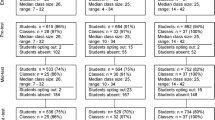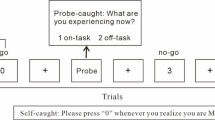Abstract
Objectives
The current study devised a mindfulness intervention program, integrating face-to-face and group training with individualized technology-accessible practices. It aimed at investigating the role of Blended Mindfulness Intervention (BMI), which combines mainstream mindfulness practices with digital tools, in university students’ sustained attention, working memory, academic achievement, and electroencephalogram (EEG) asymmetry.
Method
Sixty junior university students, selected from a pool of 72 candidates, were randomly assigned into two groups. Mindfulness training (MT) was incorporated into class activities of experimental group in a course of eight sessions. The participants of experimental group were also assigned to do some weekly follow-up activities offered via a smartphone-based mindfulness meditation application (Smiling Mind). The homogeneity of the two groups was ascertained prior the study on mindfulness, working memory (determined via Automated Operation Span [AOSPAN] task), and sustained attention. The tripartite mindfulness instruction encompassed these activities: (1) in-class general MT practices, (2) in-class educational-inspired practices, and (3) at-home practices via Smiling Mind.
Results
The results of statistical analysis via independent samples t-tests verified the efficiency of BMI in enhancing university students’ sustained attention, working memory, and academic achievement. The analysis of EEG measurements via a 19-channel device demonstrated reduction in the theta/beta ratio (TBR) values in all brain regions, including frontal, parietal, occipital, and central in posttest. The ratio is a measure often used in EEG studies to assess brain activity.
Conclusions
This study substantiated that promoting state mindfulness in MT programs develops trait mindfulness, which brings about a host of cognitive, emotional, social, and metacognitive benefits. It also demonstrated that supplementing face-to-face and group interventions with individualized and easily accessible and affordable ones seem to cater for all styles and preferences and ultimately augment the efficiency of these programs.
Preregistration
This study is not preregistered.


Similar content being viewed by others
Data Availability
Data are available on Mendeley Data, V1, https://doi.org/10.17632/b4wjw5z3gy.
References
Bailey, N. W., Baell, O., Payne, J. E., Humble, G., Geddes, H., Cahill, I., Hill, A. T., Chung, S. W., Emonson, M., Murphy, O. W., & Fitzgerald, P. B. (2023). Experienced meditators show multifaceted attention-related differences in neural activity. Mindfulness, 14(11), 2670–2698. https://doi.org/10.1007/s12671-023-02224-2
Bauer, C. C. C., Rozenkrantz, L., Caballero, C., Nieto-Castanon, A., Scherer, E., West, M. R., Mrazek, M., Phillips, D. T., Gabrieli, J. D. E., & Whitfield-Gabrieli, S. (2020). Mindfulness training preserves sustained attention and resting state anticorrelation between default-mode network and dorsolateral prefrontal cortex: A randomized controlled trial. Human Brain Mapping, 41(18), 5356–5369. https://doi.org/10.1002/hbm.25197
Bhayee, S., Tomaszewski, P., Lee, D. H., Moffat, G., Pino, L., Moreno, S., & Farb, N. A. S. (2016). Attentional and affective consequences of technology supported mindfulness training: A randomized, active control, efficacy trial. BMC Psychology, 4, 60. https://doi.org/10.1186/s40359-016-0168-6
Brown, K. W., & Ryan, R. M. (2003). The benefits of being present: Mindfulness and its role in psychological well-being. Journal of Personality and Social Psychology, 84(4), 822–848. https://doi.org/10.1037/0022-3514.84.4.822
Brown, K. W., Ryan, R. M., & Creswell, J. D. (2007). Mindfulness: Theoretical foundations and evidence for its salutary effects. Psychological Inquiry, 18(4), 211–237. https://doi.org/10.1080/10478400701598298
Bostock, S., Crosswell, A. D., Prather, A. A., & Steptoe, A. (2019). Mindfulness on-the-go: Effects of a mindfulness meditation app on work stress and well-being. Journal of Occupational Health Psychology, 24(1), 127–138. https://doi.org/10.1037/ocp0000118
Bussalb, A., Collin, S., Barthélemy, Q., Ojeda, D., Bioulac, S., Blasco-Fontecilla, H., Brandeis, D., Ouakil, D. P., Ros, T., & Mayaud, L. (2019). Is there a cluster of high theta-beta ratio patients in attention deficit hyperactivity disorder? Clinical Neurophysiology, 8, 1387–96. https://doi.org/10.1016/j.clinph.2019.02.021
Chan, B. R., & Polich, J. (2006). Meditation states and traits: EEG, ERP, and neuroimaging studies. Psychological Bulletin, 132(2), 180–211. https://doi.org/10.1037/0033-2909.132.2.180
Chiesa, A., Calati, R., & Serretti, A. (2011). Does mindfulness training improve cognitive abilities? A systematic review of neuropsychological findings. Clinical Psychology Review, 31, 449–464. https://doi.org/10.1016/j.cpr.2010.11.003
Crivelli, D., Fronda, G., Venturella, I., & Balconi, M. (2018). Supporting mindfulness practices with brain-sensing devices. Cognitive and electrophysiological evidences. Mindfulness, 10(2), 301–311. https://doi.org/10.1007/s12671-018-0975-3
Daneman, M., & Carpenter, P. A. (1980). Individual differences in working memory and reading. Journal of Verbal Learning & Verbal Behavior, 19, 450–466. https://doi.org/10.1016/S0022-5371(80)90312-6
Feruglio, S., Panasiti, M. S., Crescentini, C., Aglioti, S. M., & Ponsi, G. (2023). Training the moral self: An 8-week mindfulness meditation program leads to reduced dishonest behavior and increased regulation of interoceptive awareness. Mindfulness, 14(11), 2757–2779. https://doi.org/10.1007/s12671-023-02233-1
Ferreira, G. F., & Demarzo, M. (2023). Trends of research on mindfulness: A bibliometric study of an emerging field. Trends in Psychology. https://doi.org/10.1007/s43076-023-00286-8
Foster, J. L., Shipstead, Z., Harrison, T. L., Hicks, K. L., Redick, T. S., & Engle, R. W. (2015). Shortened complex span tasks can reliably measure working memory capacity. Memory & Cognition, 43, 226–236. https://doi.org/10.3758/s13421-014-0461-7
Finn, P. R. (2002). Motivation, working memory, and decision making: A cognitive-motivational theory of personality vulnerability to alcoholism. Behavioral & Cognitive Neuroscience Reviews, 1, 183–205. https://doi.org/10.1177/1534582302001003001
Flett, J. A. M., Hayne, H., Riordan, B. C., Thompson, L. M., & Conner, T. S. (2019). Mobile mindfulness meditation: A randomized controlled trial of the effect of two popular apps on mental health. Mindfulness, 10, 863–876. https://doi.org/10.1007/s12671-018-1050-9
Ghanizadeh, A. (2016). The interplay between reflective thinking, critical thinking, self-monitoring, and academic achievement in higher education. Higher Education, 25(4), 380–395. https://doi.org/10.1007/s10734-016-0031-y
Ghanizadeh, A. (2021). Higher education amid COVID-19 pandemic: Contributions from resilience, positive orientation and grit. Journal of Applied Research in Higher Education, 14(4), 1670–1685. https://doi.org/10.1108/JARHE-05-2021-0189
Ghanizadeh, A., & Jahedizadeh, S. (2017). The nexus between emotional, metacognitive, and motivational facets of academic achievement among Iranian university students. Journal of Applied Research in Higher Education, 9(4), 598–615. https://doi.org/10.1108/JARHE-05-2017-0060
Ghanizadeh, A., Al-Hoorie, A. H., & Jahedizadeh, S. (2020). Higher order thinking skills in the language classroom: A concise guide. Springer.
Godeano-Barr, S., Reifen-Tagar, M., Tarrasch, R., & Levit-Binnun, N. (2023). The impact of teachers’ contemplative training on classroom discussions of controversial issues: A cluster-randomized active-control trial. Mindfulness. https://doi.org/10.1007/s12671-023-02205-5
Hunkin, H., King, D. L., & Zajac, I. T. (2020). EEG neurofeedback during focused attention meditation: Effects on state mindfulness and meditation experiences. Mindfulness, 12(4), 841–851. https://doi.org/10.1007/s12671-020-01541-0
Jha, A., Stanley, E., Kiyonaga, A., Wong, L., & Gelfand, L. (2010). Examining the protective effects of mindfulness training on working memory capacity and affective experience. Emotion, 10, 54–64. https://doi.org/10.1037/a0018438
Kabat-Zinn, J. (2003). Mindfulness-based interventions in context: Past, present, and future. Clinical Psychology: Science and Practice, 10(2), 144–156. https://doi.org/10.1093/clipsy.bpg016
Kiken, L. G., Garland, E. L., Bluth, K., Palsson, O. S., & Gaylord, S. A. (2015). From a state to a trait: Trajectories of state mindfulness in meditation during intervention predict changes in trait mindfulness. Personality and Individual Differences, 81, 41–46. https://doi.org/10.1016/j.paid.2014.12.044
Klein, K., & Boals, A. (2001). The relationship of life event stress and working memory capacity. Applied Cognitive Psychology, 15, 565–579. https://doi.org/10.1002/acp.727
Li, Y., Yang, N., Zhang, Y., Xu, W., & Cai, L. (2021). The relationship among trait mindfulness, attention, and working memory in junior school students under different stressful situations. Frontier in Psychology, 12, 558690. https://doi.org/10.3389/fpsyg.2021.558690
Lomasa, T., Ivtzana, T., & Fua, C. H. Y. (2015). A systematic review of the neurophysiology of mindfulness on EEG oscillations. Neuroscience and Biobehavioral Reviews, 57, 401–410. https://doi.org/10.1016/j.neubiorev.2015.09.018
López-Ramón, M. F., Moreno-Campos, V., Alonso-Esteban, Y., Navarro-Pardo, E., & Alcantud-Marín, F. (2023). Mindfulness interventions and surveys as tools for positive emotional regulation during COVID-19: A scoping review. Mindfulness, 14(11), 2583–2601. https://doi.org/10.1007/s12671-023-02234-0
Lutz, A., Slagter, H. A., Dunne, J. D., & Davidson, R. J. (2008). Attention regulation and monitoring in meditation. Trends in Cognitive Science, 12(4), 163–169. https://doi.org/10.1016/j.tics.2008.01.005
Malinowski, P. (2013). Neural mechanisms of attentional control in mindfulness meditation. Frontiers in Neuroscience, 7, 8. https://doi.org/10.3389/fnins.2013.00008
Mak, C., Whittingham, K., Cunnington, R., & Boyd, R. N. (2018). Efficacy of mindfulness-based interventions for attention and executive function in children and adolescents—A systematic review. Mindfulness, 9(1), 59–78. https://doi.org/10.1007/s12671-017-0770-6
Moghadam, H., Ghanizadeh, A., & Ghosooly, B. (2020). Differences in EFL learners’ burnout levels and receptive language skills with regard to the mindfulness-based instruction. ExELL, 8(2), 185–219. https://doi.org/10.2478/exell-2021-0004
Moghadam, H., Ghanizadeh, A., & Ghosooly, B. (2021). The effect of mindfulness-cultivation intervention on EFL learners’ reflective thinking, positive orientation, and language achievement. Teaching English as a Second Language Quarterly, 41(1), 69–101. https://doi.org/10.22099/jtls.2021.39016.2911
Moynihan, J. A., Chapman, B. P., Klorman, R., Krasner, M. S., Duberstein, P. R., Brown, K. W., & Talbot, N. L. (2013). Mindfulness-based stress reduction for older adults: Effects on executive function, frontal alpha asymmetry and immune function. Neuropsychobiology, 68(1), 34–43. https://doi.org/10.1159/000350949
Mrazek, A. J., Mrazek, M. D., Cherolini, C. M., Cloughesy, J. N., Cynman, D. J., Gougis, L. J., Landry, A. P., Reese, J. V., & Schooler, J. W. (2019). The future of mindfulness training is digital, and the future is now. Current Opinion in Psychology, 28, 81–86. https://doi.org/10.1016/j.copsyc.2018.11.012
Muñoz, R. F. (2016). Harnessing psychology and technology to contribute to making health care a universal human right. Cognitive and Behavioral Practice, 29, 4–14. https://doi.org/10.1016/j.cbpra.2019.07.003
Muñoz, R. F., Bunge, E. L., Chen, K., Schueller, S. M., Bravin, J. I., Shaughnessy, E. A., & Pérez-Stable, E. J. (2016). Massive open online interventions: A novel model for delivering behavioral- health services worldwide. Clinical Psychological Science, 4(2), 194–205. https://doi.org/10.1177/2167702615583840
Nien, J.-T., Gill, D. L., Chou, T.-Y., Liu, C.-S., Geng, X., Hung, T.-M., & Chang, Y.-K. (2023). Effect of brief mindfulness and relaxation inductions on anxiety, affect and brain activation in athletes. Psychology of Sport and Exercise, 67, 102422. https://doi.org/10.1016/j.psychsport.2023.102422
Ng, T. K. S., Feng, L., Fam, J., Rawtaer, I., Kumar, A. P., Rane, G., ... & Mahendran, R. (2021). Mindfulness awareness practice (MAP) to prevent dementia in older adults with mild cognitive impairment: protocol of a randomized controlled trial and implementation outcomes. International Journal of Environmental Research and Public Health, 18(19), 10205. https://doi.org/10.3390/ijerph181910205
Nuwer, M. R., Buchhalter J., Shepard, K. M. (2016). Quantitative EEG in attention-deficit/hyperactivity disorder A companion payment policy review for clinicians and payers. Neurology Clinical Practice, 6(6), 543–548 https://doi.org/10.1212/CPJ.0000000000000308
Ostafin, B. D., Chawla, N., & Bowen, S. (2006). Intensive mindfulness training and the reduction of psychological distress: A preliminary study. Cognitive and Behavioral Practice, 13, 191–197. https://doi.org/10.1016/j.cbpra.2005.12.001
Pirson, M., Langer, E. J., Bodner, T., & Zilcha-Mano, S. (2012). The development and validation of the Langer mindfulness scale-enabling a socio-cognitive perspective of mindfulness in organizational contexts. Fordham University Schools of Business Research Paper https://doi.org/10.2139/ssrn.2158921
Rosen, V. M., Bergeson, J. L., Putnam, K., Harwell, A., & Sunderland, T. (2002). Working memory and apolipoprotein E: What’s the connection? Neuropsychologia, 40, 2226–2233. https://doi.org/10.1016/s0028-3932(02)00132-x
Sas, C., & Chopra, R. (2015). MeditAid: A wearable adaptive neurofeedback-based system for training mindfulness state. Personal and Ubiquitous Computing, 19, 1169–1182. https://doi.org/10.1007/s00779-015-0870-z
Semple, R. J., Lee, J., Rosa, D., & Miller, L. F. (2010). A randomized trial of mindfulness-based cognitive therapy for children: Promoting mindful attention to enhance social-emotional resiliency in children. Journal of Child and Family Studies, 19, 218–229. https://doi.org/10.1007/s10826-009-9301-y
Shanok, N. A., Reive, C., Mize, K. D., & Jones, N. A. (2019). Mindfulness meditation intervention alters neurophysiological symptoms of anxiety and depression in preadolescents. Journal of Psychophysiology, 34(3), 159–170. https://doi.org/10.1027/0269-8803/a000244
Shipstead, Z., Redick, T. S., & Engle, R. W. (2012). Is working memory training effective? Psychological Bulletin, 138, 628–654. https://doi.org/10.1037/a0027473
Siripornpanich, V., Sampoon, K., Chaithirayanon, S., Kotchabhakdi, N., & Chutabhakdikul, N. (2018). Enhancing brain maturation through a mindfulness-based education in elementary school children: A quantitative EEG study. Mindfulness, 9, 1877–1884. https://doi.org/10.1007/s12671-018-0930-3
Spira, E. G., & Fischel, J. E. (2005). The impact of preschool inattention, hyperactivity, and impulsivity on social and academic development: A review. Canadian Journal of Psychology, 46, 755–773. https://doi.org/10.1111/j.1469-7610.2005.01466.x
Svetlov, A. S., Nelson, M. M., Antonenko, P. D., McNamara, J. P. H., & Bussing, R. (2019). Commercial mindfulness aid does not aid short-term stress reduction compared to unassisted relaxation. Heliyon, 5, 1–22. https://doi.org/10.1016/j.heliyon.2019.e01351
Teasdale, J. D., Segal, Z., & Williams, J. M. (1995). How does cognitive therapy prevent depressive relapse and why should attentional control (mindfulness) training help? Behaviour Research and Therapy, 33, 25–39. https://doi.org/10.1016/0005-7967(94)e0011-7
Treves, I. N., Olson, H. A., Ozernov-Palchik, O., Li, C. E., Wang, K. L., Arechiga, X. M., Goldberg, S.B., & Gabrieli, J. D. (2023). At-home use of app-based mindfulness for children: A randomized active-controlled trial. Mindfulness, 14(11), 2728–2744. https://doi.org/10.1007/s12671-023-02231-3
Turner, M. L., & Engle, R. W. (1989). Is working memory capacity task dependent? Journal of Memory & Language, 28, 127–154. https://doi.org/10.1016/0749-596X(89)90040-5
Unsworth, N., Heitz, R. P., Schrock, J. C., & Engle, R. W. (2005). An automated version of the operation span task. Behavior Research Methods, 37(3), 498–505. https://doi.org/10.3758/BF03192720
Van Vreeswijk, M., Broersen, J., & Schurink, G. (2014). Mindfulness and schema therapy: A practical guide. John Wiley & Sons.
Wadlinger, H. A., & Isaacowitz, D. M. (2011). Fixing our focus: Training attention to regulate emotion. Personality and Social. Psychology Review, 15, 75–102. https://doi.org/10.1177/1088868310365565
Wahbeh, H., Lane, J. B., Goodrich, E., Miller, M., & Okan, B. S. (2014). One-on-one mindfulness meditation trainings in a research setting. Mindfulness, 5, 88–99. https://doi.org/10.1007/s12671-012-0155-9
Wei, F. Y. F., Wang, Y. K., & Klausner, M. (2012). Rethinking college students’ self-regulation and sustained attention: Does text messaging during class influence cognitive learning? Communication Education, 61(3), 185–204. https://doi.org/10.1080/03634523.2012.672755
Author information
Authors and Affiliations
Contributions
Ghasem Sadeghi Bajestani: supervision, EEG recording and analysis. Afsaneh Ghanizadeh: supervision, conceptualization, methodology, statistical analysis, writing, reviewing, and editing. Fatemeh Makhlooghi: EEG recording and analysis. Fatemeh Hosseinpour: experimental phase, investigation, data handling. Akram Hosseini: experimental phase, data collection. Mehran Beiraghi Toosi: EEG recording and analysis.
Corresponding author
Ethics declarations
Ethics Approval
This study was approved by the research ethics committee of Imam Reza International University (IR.IMAMREZA.REC.1402.008) involving the formal consents of all participants.
Informed Consent
The formal informed consents were obtained from all participants prior to their participation in the study.
Conflict of Interest
The authors state that they do not have any conflict of interests.
Use of Artificial Intelligence Statement
AI was not used in any stage of manuscript writing and editing.
Additional information
Publisher's Note
Springer Nature remains neutral with regard to jurisdictional claims in published maps and institutional affiliations.
Rights and permissions
Springer Nature or its licensor (e.g. a society or other partner) holds exclusive rights to this article under a publishing agreement with the author(s) or other rightsholder(s); author self-archiving of the accepted manuscript version of this article is solely governed by the terms of such publishing agreement and applicable law.
About this article
Cite this article
Bajestani, G.S., Ghanizadeh, A., Makhloughi, F. et al. The Impact of Blended Mindfulness Intervention (BMI) on University Students’ Sustained Attention, Working Memory, Academic Achievement, and Electroencephalogram (EEG) Asymmetry. Mindfulness 15, 675–688 (2024). https://doi.org/10.1007/s12671-024-02317-6
Accepted:
Published:
Issue Date:
DOI: https://doi.org/10.1007/s12671-024-02317-6




